Malcolm Gladwell Quotes
Most popular Malcolm Gladwell Quotes

Achievement is talent plus preparation.

Our snap judgments and first impressions can be educated and controlled.
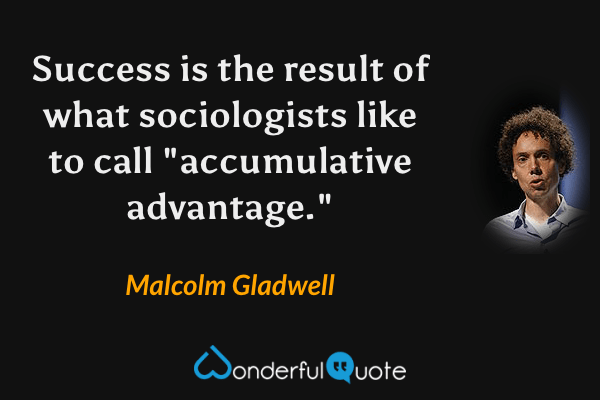
Success is the result of what sociologists like to call "accumulative advantage."

The word Maven comes from the Yiddish, and it means one who accumulates knowledge.
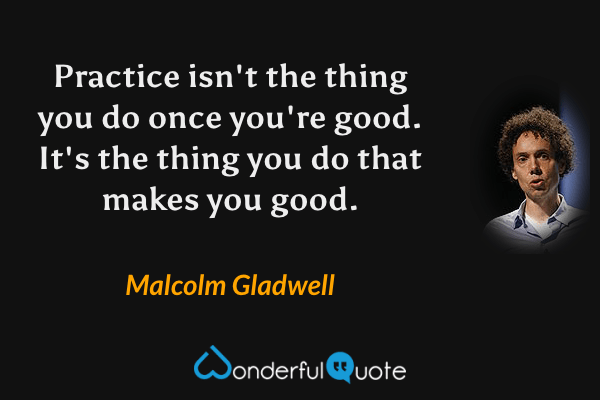
Practice isn't the thing you do once you're good. It's the thing you do that makes you good.

Decisions made very quickly can be every bit as good as decisions made cautiously and deliberately.

The talent myth assumes that people make organizations smart. More often than not, it's the other way around.

The Power of Context says that human beings are a lot more sensitive to their environment than they may seem.

We learn by example and by direct experience because there are real limits to the adequacy of verbal instruction.

Insight is not a lightbulb that goes off inside our heads. It is a flickering candle that can easily be snuffed out.
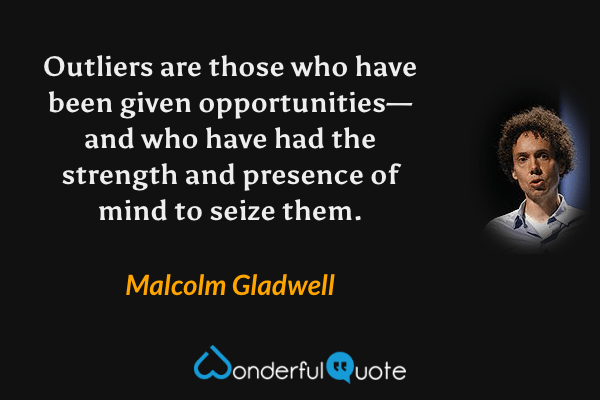
Outliers are those who have been given opportunities—and who have had the strength and presence of mind to seize them.

If you work hard enough and assert yourself, and use your mind and imagination, you can shape the world to your desires.

There is more courage and heroism in defying the human impulse, in taking the purposeful and painful steps to prepare for the unimaginable.
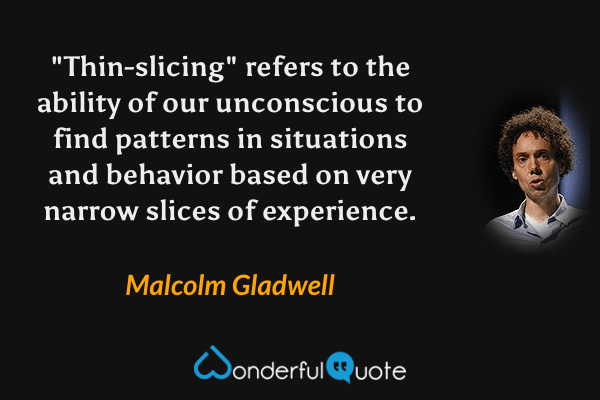
"Thin-slicing" refers to the ability of our unconscious to find patterns in situations and behavior based on very narrow slices of experience.

The key to good decision making is not knowledge. It is understanding. We are swimming in the former. We are desperately lacking in the latter.

People are ignorant of the things that affect their actions, yet they rarely feel ignorant. We need to accept our ignorance and say "I don't know" more often.

Understanding the true nature of instinctive decision making requires us to be forgiving of those people trapped in circumstances where good judgment is imperiled.

Three things—autonomy, complexity, and a connection between effort and reward—are, most people agree, the three qualities that work has to have if it is to be satisfying.
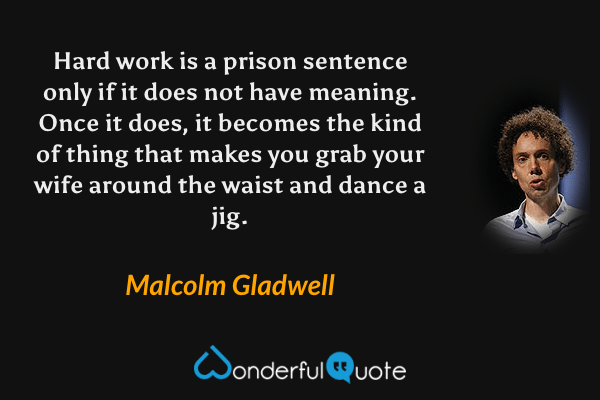
Hard work is a prison sentence only if it does not have meaning. Once it does, it becomes the kind of thing that makes you grab your wife around the waist and dance a jig.
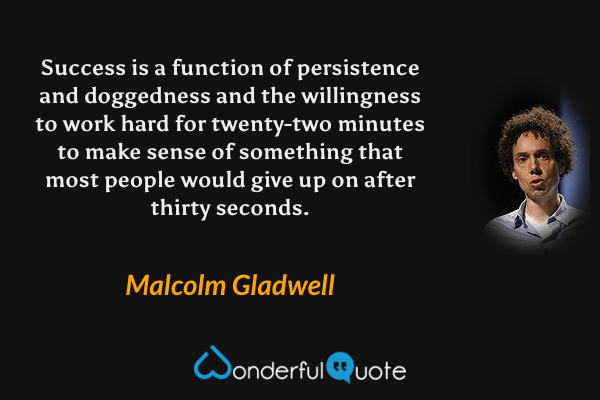
Success is a function of persistence and doggedness and the willingness to work hard for twenty-two minutes to make sense of something that most people would give up on after thirty seconds.
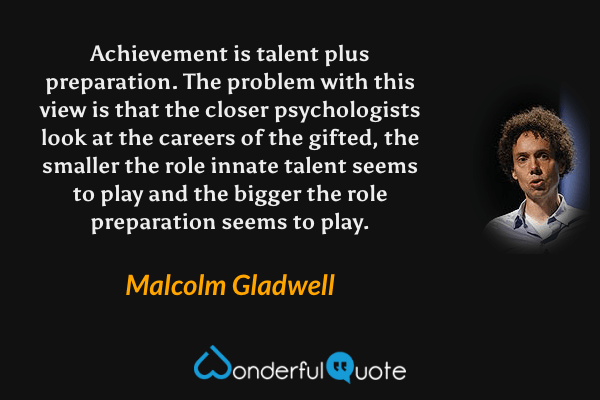
Achievement is talent plus preparation. The problem with this view is that the closer psychologists look at the careers of the gifted, the smaller the role innate talent seems to play and the bigger the role preparation seems to play.
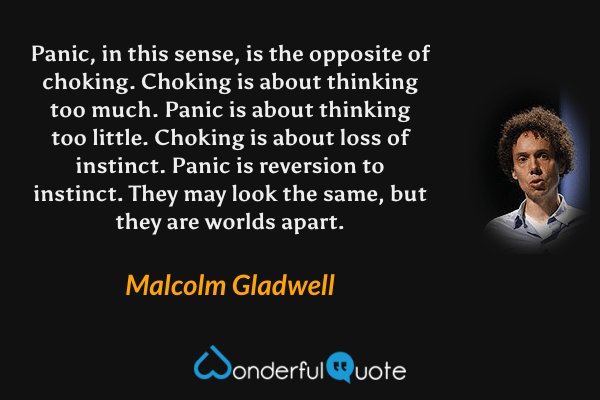
Panic, in this sense, is the opposite of choking. Choking is about thinking too much. Panic is about thinking too little. Choking is about loss of instinct. Panic is reversion to instinct. They may look the same, but they are worlds apart.

Under certain circumstances, changes that appear to make a system or an organization safer in fact don't. Why? Because human beings have a seemingly fundamental tendency to compensate for lower risks in one area by taking greater risks in another.

The Stickiness Factor says that there are specific ways of making a contagious message memorable; there are relatively simple changes in the presentation and structuring of information that can make a big difference in how much of an impact it makes.

Six degrees of separation doesn't mean that everyone is linked to everyone else in just six steps. It means that a very small number of people are linked to everyone else in a few steps, and the rest of us are linked to the world through those special few.
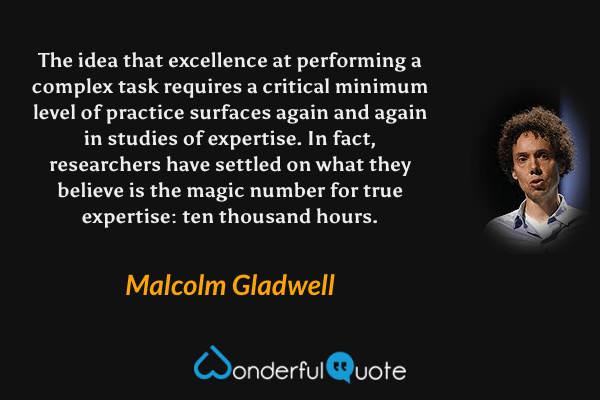
The idea that excellence at performing a complex task requires a critical minimum level of practice surfaces again and again in studies of expertise. In fact, researchers have settled on what they believe is the magic number for true expertise: ten thousand hours.

The Law of the Few says that there are exceptional people out there who are capable of starting epidemics. All you have to do is find them. The lesson of stickiness is the same. There is a simple way to package information that, under the right circumstances, can make it irresistible. All you have to do is find it.
![These three characteristics [of a tipping point]—one, contagiousness; two, the fact that little causes can have big effects; and three, that change happens not gradually but at one dramatic moment ... The name given to that one dramatic moment in an epidemic when everything can change all at once is the Tipping Point. - Malcolm Gladwell quote.](/img/q/47/1447A-these-three-characteristics-of-a-tipping-point-one-contagiousness-two-malcolm-gladwell.png)
These three characteristics [of a tipping point]—one, contagiousness; two, the fact that little causes can have big effects; and three, that change happens not gradually but at one dramatic moment ... The name given to that one dramatic moment in an epidemic when everything can change all at once is the Tipping Point.
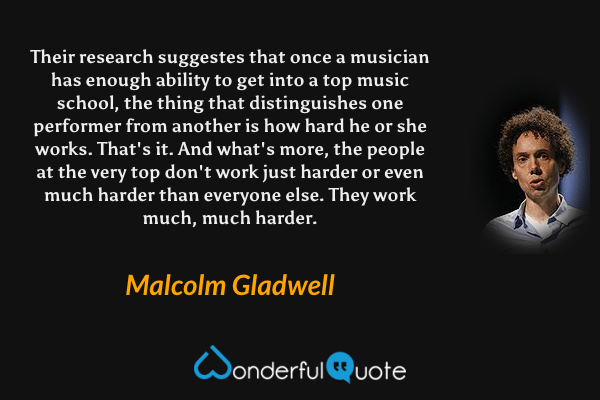
Their research suggestes that once a musician has enough ability to get into a top music school, the thing that distinguishes one performer from another is how hard he or she works. That's it. And what's more, the people at the very top don't work just harder or even much harder than everyone else. They work much, much harder.

In a social epidemic, Mavens are data banks. They provide the message. Connectors are social glue: they spread it. But there is also a select group of people—Salesmen—with the skills to persuade us when we are unconvinced of what we are hearing, and they are as critical to the tipping of word of mouth epidemics as the other two groups.

When should we trust our instincts, and when should we consciously think things through? Well, here is a partial answer. On straightforward choices, deliberate analysis is best. When questions of analysis and personal choice start to get complicated—when we have to juggle many different variables—then our unconscious thought processes may be superior.

When making a decision of minor importance, I have always found it advantageous to consider all the pros and cons. In vital matters, however, such as the choice of a mate or a profession, the decision should come from the unconscious, from somewhere within ourselves. In the important decisions of personal life, we should be governed, I think, by the deep inner needs of our nature.

We live in a world saturated with information. We have virtually unlimited amounts of data at our fingertips at all times, and we're well versed in the arguments about the dangers of not knowing enough and not doing our homework. But what I have sensed is an enormous frustration with the unexpected costs of knowing too much, of being inundated with information. We have come to confuse information with understanding.

These three agents of change I call the Law of the Few, the Stickiness Factor, and the Power of Context. ... The Law of the Few says that there are exceptional people out there who are capable of starting epidemics. ... The Stickiness Factor says that there are specific ways of making a contagious message memorable; there are relatively simple changes in the presentation and structuring of information that can make a big difference in how much of an impact it makes. ... The Power of Context says that human beings are a lot more sensitive to their environment than they may seem.


